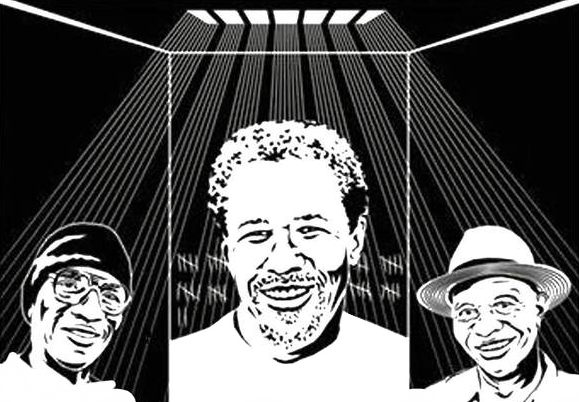The case of The Angola Three made up of Robert King, Albert Woodfox and Herman Wallace, three African-American former prison inmates of the Louisiana State Penitentiary also known as Angola Prison, makes for interesting observation.
Albert Woodfox and Herman Wallace were indicted in April 1972 for the killing of a prison corrections officer. They were convicted in January 1974. The pair served more than 40 years each – the “longest period of solitary confinement in American prison history.”
King was convicted of a separate prison murder in 1973 and spent 29 years in solitary confinement before his conviction was overturned on appeal; he was released in 2001 after taking a plea deal. From the late 1990s, each case was assessed, and activists began to work to have the cases appealed and convictions overturned because of doubts raised about the original trials.
It took 71-year-old Herman Wallace being diagnosed with terminal liver cancer in July 2013 and Amnesty International calling for his release to gain freedom on October 1, 2013. The state, however, showed bad faith by re-indicting him on October 3, 2013 however he died the following day, before he could be re-arrested.
That leaves us with Woodfox whose conviction was overturned by the US Court of Appeals on November 20, 2014. In April 2015, his lawyer applied for an unconditional writ for his release leading to his freedom on February 19, 2016, after the prosecution agreed to drop its push for a retrial and accept his plea of no contest to lesser charges of burglary and manslaughter.
Woodfox would have liked the chance to prove his innocence, but chose the plea deal because of advanced age and health issues.
What then was the motivation for prison officials to throw the three in solitary confinement?
The Angola Three said they were targeted by prison officials because they spoke out against inhumane treatment and racial segregation at the notorious Louisiana prison built on a former slave plantation. They had opened a chapter of the revolutionary Black Panther Party where they challenged the status quo which deprived African-Americans of rights in the prison.
Their activity of helping inmates become literate and aware of their rights was a source of worry for the prison guards who viewed them as stirring the pot. So when 23-year-old Brent Miller, a white guard at the notorious Angola Prison was found dead in a cell with multiple stab wounds, the three men were convicted of his murder and placed in solitary confinement.

Woodfox and Herman Wallace, who were sent to Angola for unrelated cases of armed robbery, were convicted of the Miller murder in 1972.
The trials were deeply flawed reflecting the rife discrimination and corruption in Louisiana’s justice system. A third man, Robert King, was accused of planning the murder from another jail.
Almost immediately after the discovery of Miller’s body, covered with stab wounds, Wallace and Woodfox were placed in small airless isolation cells. Many wanted answers and fast.
Prosecutors failed to produce any physical evidence linking the men to the murder. A bloody print found at the murder scene was used as evidence, even though it did not match those of the men accused of the crime.
Since the original trial, it emerged the main eyewitness was bribed by prison officials to give statements against the men; while the state withheld evidence about the perjured testimony of another inmate. Other witnesses retracted their testimony.
Angola was known for its brutal treatment of detainees with inmates racially segregated and guarded exclusively by white officers. Murder and rape were also endemic.
Curiously, Woodfox had his conviction overturned three times but the state appealed. He was confined to a 2×3 meter cell, 23 hours a day, only allowed out to exercise alone in a small outdoor cage or to walk along the cell unit corridor and shower.
The situation, according to Woodfox’s lawyer, made him suffer from claustrophobia, hypertension, heart disease, chronic renal insufficiency, diabetes, anxiety and insomnia.
His attorney George Kendall noted “Albert survived the extreme and cruel punishment of 40 plus years in solitary confinement only because of his extraordinary strength and character.”
The Black Panther activist, who spent a record 43 years in solitary confinement was freed from a U.S. prison on his 69th birthday.
“Although I was looking forward to proving my innocence at a new trial, concerns about my health and my age have caused me to resolve this case now and obtain my release with this no-contest plea to lesser charges,” Woodfox said in a statement upon his freedom.
“On my release, on 19 February 2016, my brother Michael took me home and I lived with him and his wife and son in their house for almost a year. I got medical care that I needed. In my mind, heart, soul, and spirit I always felt free, so my attitudes and thoughts didn’t change much after I was released. But to be in my physical body in the physical world again was like being newly born. I had to learn to use my hands in new ways – for seat belts, for cellphones, to close doors behind me, to push buttons in an elevator, to drive. I had to relearn how to walk down stairs, how to walk without leg irons, how to sit without being shackled,” Woodfox summed up.










